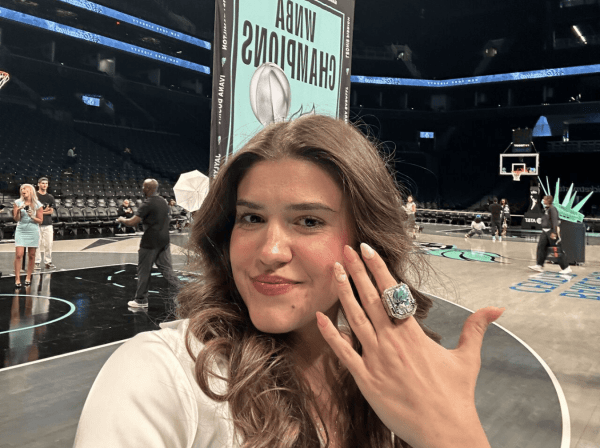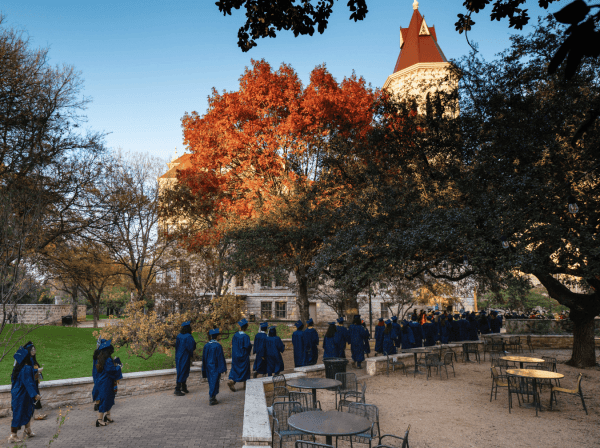Discovery in Action at St. Edward's
Professors at St. Edward’s engage in diverse and creative research projects, and they consistently partner with their students to explore new findings.
Their research activities inspire students, expand knowledge and understanding of academic fields, and inform their classroom teaching. Here, we highlight a sampling of outstanding projects our teacher-scholars are engaged in — from creating a video game development program or a solo art exhibition, to providing insights on foster-care challenges for LGBTQ youth. See how they draw on their expertise to contribute to society.
Boosting Opportunities with a $1.5 Million STEM Grant
St. Edward’s has received a prestigious five-year, $1.5 million grant from the National Science Foundation (NSF) to establish the Institute for Interdisciplinary Science, which will prepare students for careers in the 4th Industrial Revolution — an era marked by advancements in robotics, artificial intelligence, 3D printing, biotechnology and other emerging technologies.
The NFS award will increase the capacity to prepare more students — particularly minority students who are underrepresented across most STEM professions — to enter and be successful in STEM careers. Biological Sciences Professor Andrea Holgado, says that part of the NSF funding will go toward providing paid student internships with industry and nonprofit organizations in Austin and beyond.

(Shown left to right) Holgado, the grant’s principal investigator, and co-principal investigators Charles Hauser, associate professor of Bioinformatics, Laura J. Baker, professor of Computer Science, Raychelle Burks, assistant professor of Chemistry, and Paul Walter, assistant professor of Physics, form the leadership team for this endeavor.

Elevating Spanish Spoken by Heritage Speakers

Emily D. Bernate, assistant professor of Spanish and Linguistics at St. Edward’s, has made it her mission to elevate the often- dismissed variety of Spanish called U.S. Spanish that is spoken in many Latino homes in the United States. Her goal is to help educators work more effectively with young heritage speakers (people raised in a bi-lingual home where a non-majority language is spoken) to build upon their language and cultural knowledge.
Bernate’s focused research aims to prove that U.S. Spanish is a valuable resource that should be cultivated and that heritage speakers should not be stigmatized for the kind of Spanish they speak. She has authored a soon-to-be-published book chapter on the expression of linguistic politeness in U.S. Spanish. Meanwhile, Bernate is applying her linguistics research to her own classroom, teaching a Spanish course designed for heritage learners at St. Edward’s. Learn more about Bernate’s research and teaching.
Evolving a Video Game Development Program

This fall, St. Edward’s launched a minor degree in Video Game Development, giving students of all majors an opportunity to add video game development skills to their resumes.
The minor is the latest addition to the university’s Video Game Development program, which is taking shape under Robert Denton Bryant, the program’s director. Bryant has more than 30 years of experience in writing and video game development. His goals include leveraging the program’s location in Austin — which is the third top city for game studios in the country — to create connections between students and local game studios and businesses for internships and class projects.
Bryant believes the minor will give job seekers an edge in whichever professional path they choose. Learn more about how Bryant is evolving the Video Game Development program and his thoughts on nerd culture, diversity in the gaming industry and the Austin gaming community.
Understanding the Violence Migrant Women Experience

Women from Central America are crossing the U.S.–Mexico border in increasing numbers to escape poverty, domestic abuse, gang violence and other life-threatening circumstances. Advocates and social workers are seeking to better understand the special needs of these women in comparison to other migrant groups.
Enter Laurie Cook Heffron, assistant professor of Social Work at St. Edward’s, who undertook a study to help inform advocacy programs and federal and state policy of the challenges facing this population. Her work aims to influence effective care and service responses for these women.
The study’s findings illuminate the present-day reality that migrant women from Central America are vulnerable to violence and abuse throughout their journey, including during their stay in U.S. immigration detention facilities. These women are susceptible to sexual assault, rape as a price of border-crossing, and exploitation and human trafficking. The study, titled “Salia de Uno Y Meti en Otro: Exploring the Migration-Violence Nexus Among Central American Women,” (I left one bad situation and entered another) was published in the Violence Against Women Journal on Sept. 21, 2018. Learn more about what Heffron’s important research reveals and recommends.
Challenging Our Perceptions of the Ordinary

Nationally exhibited artist Tammie Rubin, assistant professor of Sculpture and Ceramics at St. Edward’s, disrupts the associations we have with mundane objects. Her current body of work mines her family history and is an investigation of The Great Migration.
From Chicago to Austin, Rubin has found her footing in the community, showcasing work in a host of group and solo-exhibitions, including a solo exhibit at Women and Their Work in Austin, which runs from Nov. 17 through Jan. 10, 2018.
Earlier this year, Rubin participated in a 6-week outdoor installation at The Museum of Human Achievement in Austin, in which she set up her studio in a caged trailer, allowing her art making to be open and visible to the public. Rubin’s work was also recently showcased at ICOSA gallery in Canopy, an East Austin community of artist studios and galleries. Learn more about Rubin’s background, art and teaching, and see photos and a video of her art practice.
Improving the Foster Care Experience for LGBTQ Youth

As a social worker, Adam McCormick, assistant professor of Social Work at St. Edward’s, believes that the foster care system is unjustly challenging for LGBTQ (lesbian, gay, bisexual, transgender, questioning) youth, who risk dealing with rejection, separation from siblings and abuse for coming out. These young people are overrepresented in the foster care system compared to their non-LGBTQ peers, according to research. And without proper training and insights, even well-meaning social workers and foster parents can cause unintentional emotional harm to LGBTQ youth in their care.
McCormick is addressing this need for training with his first book, LGBTQ Youth in Foster Care, a practical guide designed to help social workers and foster parents better understand, connect with and care for LGBTQ youth in the foster care system. He also seeks to put a face on the distinct issues facing LGBTQ youth in foster care through vignettes of young people describing their experiences. Learn more about McCormick’s views on improving the foster care system for LGBTQ youth and his advice for social workers and foster families.


